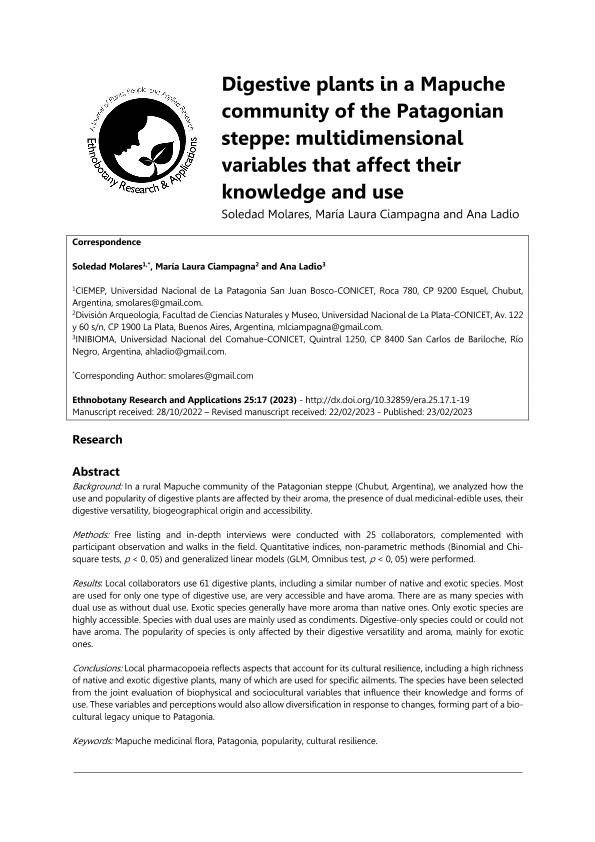Mostrar el registro sencillo del ítem
dc.contributor.author
Molares, Soledad

dc.contributor.author
Ciampagna, María Laura

dc.contributor.author
Ladio, Ana Haydee

dc.date.available
2023-10-12T19:28:39Z
dc.date.issued
2023-02
dc.identifier.citation
Molares, Soledad; Ciampagna, María Laura; Ladio, Ana Haydee; Digestive plants in a Mapuche community of the Patagonian steppe: multidimensional variables that affect their knowledge and use; Ilia State University; Ethnobotany Research and Applications; 25; 2-2023; 1-19
dc.identifier.issn
1547-3465
dc.identifier.uri
http://hdl.handle.net/11336/215043
dc.description.abstract
Background: In a rural Mapuche community of the Patagonian steppe (Chubut, Argentina), we analyzed how the use and popularity of digestive plants are affected by their aroma, the presence of dual medicinal-edible uses, their digestive versatility, biogeographical origin and accessibility. Methods: Free listing and in-depth interviews were conducted with 25 collaborators, complemented with participant observation and walks in the field. Quantitative indices, non-parametric methods (Binomial and Chi-square tests, p < 0, 05) and generalized linear models (GLM, Omnibus test, p < 0, 05) were performed. Results: Local collaborators use 61 digestive plants, including a similar number of native and exotic species. Most are used for only one type of digestive use, are very accessible and have aroma. There are as many species with dual use as without dual use. Exotic species generally have more aroma than native ones. Only exotic species are highly accessible. Species with dual uses are mainly used as condiments. Digestive-only species could or could not have aroma. The popularity of species is only affected by their digestive versatility and aroma, mainly for exotic ones. Conclusions: Local pharmacopoeia reflects aspects that account for its cultural resilience, including a high richness of native and exotic digestive plants, many of which are used for specific ailments. The species have been selected from the joint evaluation of biophysical and sociocultural variables that influence their knowledge and forms of use. These variables and perceptions would also allow diversification in response to changes, forming part of a bio-cultural legacy unique to Patagonia.
dc.format
application/pdf
dc.language.iso
eng
dc.publisher
Ilia State University
dc.rights
info:eu-repo/semantics/openAccess
dc.rights.uri
https://creativecommons.org/licenses/by-nc-sa/2.5/ar/
dc.subject
CULTURAL RESILIENCE
dc.subject
MAPUCHE MEDICINAL FLORA
dc.subject
PATAGONIA
dc.subject
POPULARITY
dc.subject.classification
Ciencias Sociales Interdisciplinarias

dc.subject.classification
Otras Ciencias Sociales

dc.subject.classification
CIENCIAS SOCIALES

dc.subject.classification
Ciencias de las Plantas, Botánica

dc.subject.classification
Ciencias Biológicas

dc.subject.classification
CIENCIAS NATURALES Y EXACTAS

dc.title
Digestive plants in a Mapuche community of the Patagonian steppe: multidimensional variables that affect their knowledge and use
dc.type
info:eu-repo/semantics/article
dc.type
info:ar-repo/semantics/artículo
dc.type
info:eu-repo/semantics/publishedVersion
dc.date.updated
2023-09-15T12:35:31Z
dc.journal.volume
25
dc.journal.pagination
1-19
dc.journal.pais
Estados Unidos

dc.description.fil
Fil: Molares, Soledad. Consejo Nacional de Investigaciones Científicas y Técnicas. Centro Científico Tecnológico Conicet - Patagonia Norte. Centro de Investigación Esquel de Montaña y Estepa Patagóica. Universidad Nacional de la Patagonia "San Juan Bosco". Facultad de Ciencias Naturales - Sede Esquel. Centro de Investigación Esquel de Montaña y Estepa Patagónica; Argentina
dc.description.fil
Fil: Ciampagna, María Laura. Consejo Nacional de Investigaciones Científicas y Técnicas. Centro Científico Tecnológico Conicet - La Plata; Argentina. Universidad Nacional de La Plata. Facultad de Ciencias Naturales y Museo. División Arqueología; Argentina
dc.description.fil
Fil: Ladio, Ana Haydee. Consejo Nacional de Investigaciones Científicas y Técnicas. Centro Científico Tecnológico Conicet - Patagonia Norte. Instituto de Investigaciones en Biodiversidad y Medioambiente. Universidad Nacional del Comahue. Centro Regional Universidad Bariloche. Instituto de Investigaciones en Biodiversidad y Medioambiente; Argentina
dc.journal.title
Ethnobotany Research and Applications
dc.relation.alternativeid
info:eu-repo/semantics/altIdentifier/url/https://ethnobotanyjournal.org/index.php/era/article/view/4223
dc.relation.alternativeid
info:eu-repo/semantics/altIdentifier/doi/http://dx.doi.org/10.32859/era.25.17.1-19
Archivos asociados
